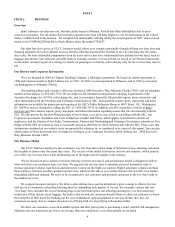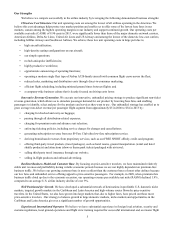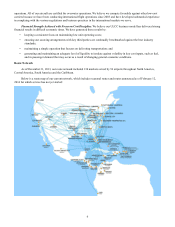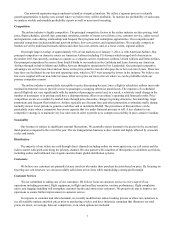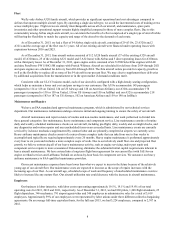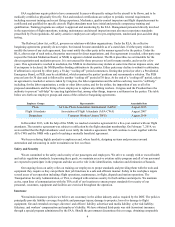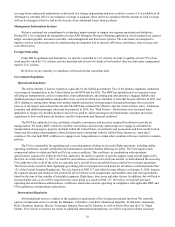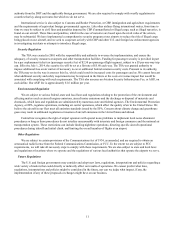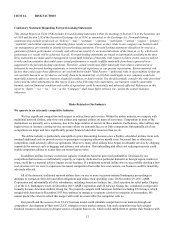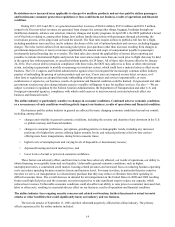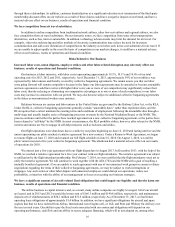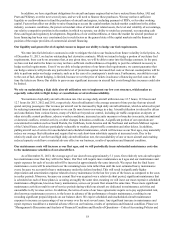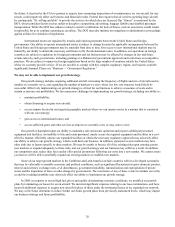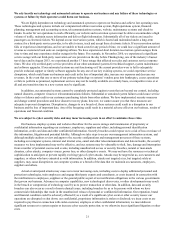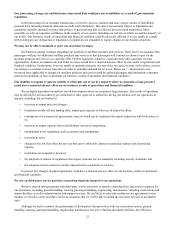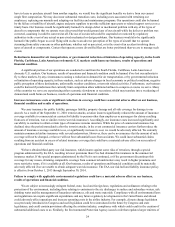Spirit Airlines 2013 Annual Report Download - page 14
Download and view the complete annual report
Please find page 14 of the 2013 Spirit Airlines annual report below. You can navigate through the pages in the report by either clicking on the pages listed below, or by using the keyword search tool below to find specific information within the annual report.14
Restrictions on or increased taxes applicable to charges for ancillary products and services paid by airline passengers
and burdensome consumer protection regulations or laws could harm our business, results of operations and financial
condition.
During 2013, 2012 and 2011, we generated non-ticket revenues of $668.4 million, $535.6 million and $381.5 million,
respectively. Our non-ticket revenues are generated from charges for, among other things, baggage, bookings through our
distribution channels, advance seat selection, itinerary changes and loyalty programs. In April 2011, the DOT published a broad
set of final rules relating to, among other things, how airlines handle interactions with passengers through advertising, the
reservations process, at the airport and on board the aircraft. The final rules require airlines to publish a full fare for a flight,
including mandatory taxes and fees, and to enhance disclosure of the cost of optional products and services, including baggage
charges. The rules restrict airlines from increasing ticket prices post-purchase (other than increases resulting from changes in
government-imposed fees or taxes) or increase significantly the amount and scope of compensation payable to passengers
involuntarily denied boarding due to oversales. The final rules also extend the applicability of tarmac delay reporting and
penalties to include international flights and provide that reservations made more than one week prior to flight date may be held
at the quoted fare without payment, or cancelled without penalty, for 24 hours. All of these rules became effective by January
24, 2012. If we are not able to remain in compliance with these rules, the DOT may subject us to fines or other enforcement
action, including requirements to modify our passenger reservations system, which could have a material adverse effect on our
business. The U.S. Congress and Federal administrative agencies have investigated the increasingly common airline industry
practice of unbundling the pricing of certain products and services. If new taxes are imposed on non-ticket revenues, or if
other laws or regulations are adopted that make unbundling of airline products and services impermissible, or more
cumbersome or expensive, our business, results of operations and financial condition could be harmed. Congressional and other
government scrutiny may also change industry practice or public willingness to pay for ancillary services. See also “—We are
subject to extensive regulation by the Federal Aviation Administration, the Department of Transportation and other U.S. and
foreign governmental agencies, compliance with which could cause us to incur increased costs and adversely affect our
business and financial results.”
The airline industry is particularly sensitive to changes in economic conditions. Continued adverse economic conditions
or a reoccurrence of such conditions would negatively impact our business, results of operations and financial condition.
Our business and the airline industry in general are affected by many changing economic conditions beyond our control,
including, among others:
• changes and volatility in general economic conditions, including the severity and duration of any downturn in the U.S.
or global economy and financial markets;
• changes in consumer preferences, perceptions, spending patterns or demographic trends, including any increased
preference for higher-fare carriers offering higher amenity levels, and reduced preferences for low-fare carriers
offering more basic transportation, during better economic times;
• higher levels of unemployment and varying levels of disposable or discretionary income;
• depressed housing and stock market prices; and
• lower levels of actual or perceived consumer confidence.
These factors can adversely affect, and from time to time have adversely affected, our results of operations, our ability to
obtain financing on acceptable terms and our liquidity. Unfavorable general economic conditions, such as higher
unemployment rates, a constrained credit market, housing-related pressures and increased focus on reducing business operating
costs can reduce spending for price-sensitive leisure and business travel. For many travelers, in particular the price-sensitive
travelers we serve, air transportation is a discretionary purchase that they may reduce or eliminate from their spending in
difficult economic times. The overall decrease in demand for air transportation in the United States in 2008 and 2009 resulting
from record high fuel prices and the economic recession required us to take significant steps to reduce our capacity, which
reduced our revenues. Unfavorable economic conditions could also affect our ability to raise prices to counteract increased fuel,
labor or other costs, resulting in a material adverse effect on our business, results of operations and financial condition.
The airline industry faces ongoing security concerns and related cost burdens, further threatened or actual terrorist
attacks or other hostilities that could significantly harm our industry and our business.
The terrorist attacks of September 11, 2001 and their aftermath negatively affected the airline industry. The primary
effects experienced by the airline industry included:


